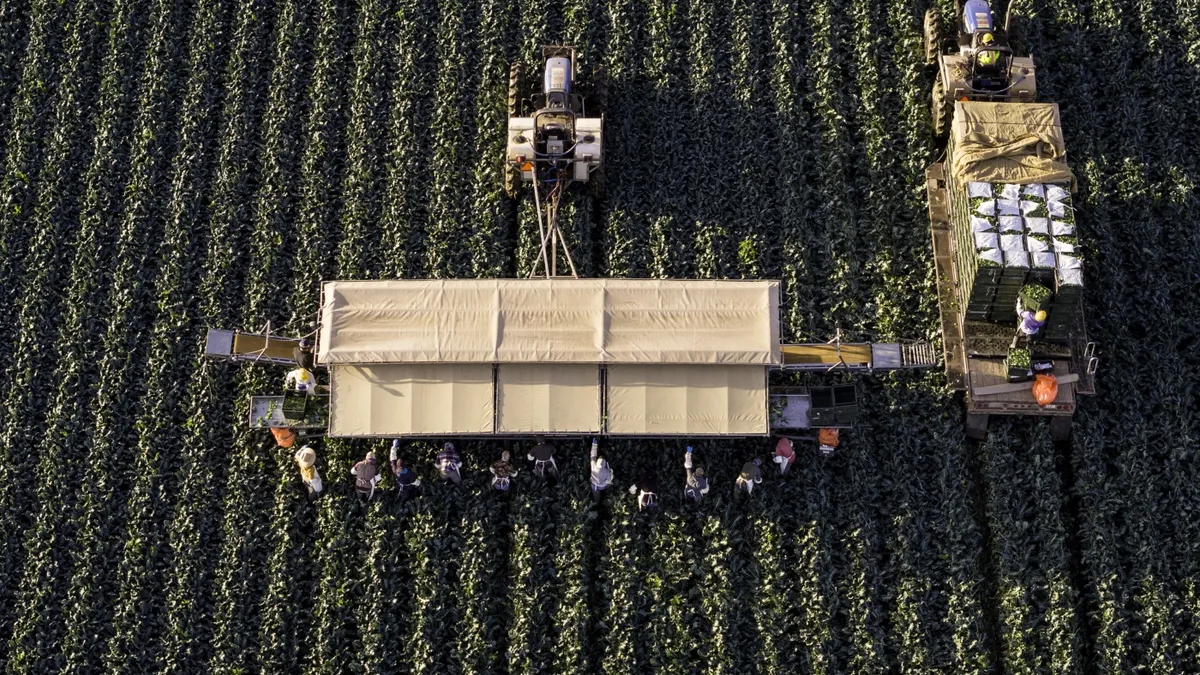
In a recent statement, President Trump pledged to assist in safeguarding agricultural workers just days after federal immigration officials launched a significant operation targeting farms and meatpacking plants to detain individuals lacking legal status. This initiative marks a shift in the Trump administration's approach, which has previously conveyed mixed signals to the agricultural community regarding the consequences of mass deportations on their workforce.
The agriculture industry relies heavily on workers who often do not possess legal permission to work in the United States. In several regions, particularly near meatpacking plants, many employees hold temporary protected status or parole, which typically includes work authorization. However, recent actions by the Trump administration have stripped many of these protections away. Historically, the administration's focus on worksite enforcement had largely spared the agricultural sector; however, this changed dramatically on June 11 when Immigration and Customs Enforcement (ICE) officers arrested over 70 individuals at a meatpacking facility in Omaha, Nebraska, while other federal agents simultaneously targeted farms in northern Los Angeles.
Roger Garcia, a Douglas County commissioner in Nebraska, shared the distress experienced by communities following these raids. "People who had their mothers taken away, their spouses… just individuals who have been working here for decades raising a family," he lamented. "These are just individuals who want to work and unfortunately got caught up in the raid."
In the aftermath of the raids, President Trump expressed optimism for a potential resolution for farmers, stating, "We can't take farmers and take all their people and send them back because they don't have maybe what they're supposed to have." Yet, other members of his administration have conveyed a starkly different message: all individuals without legal status must depart or face arrest. Homeland Security Secretary Kristi Noem emphasized the importance of upholding laws, stating that ignoring them for the sake of employment is "absolutely ridiculous."
Meanwhile, White House Border Czar Tom Homan reiterated the administration's commitment to increasing worksite enforcement. "These operations protect not only American workers but also illegal aliens," a Department of Homeland Security spokesperson stated. This dual focus aims to prevent the exploitation of workers while maintaining labor market integrity.
Elizabeth Strater, director of strategic campaigns for United Farm Workers, noted that the recent enforcement actions represent the most significant targeting of the agricultural sector she has witnessed. Reports have emerged indicating that some employers successfully prevented federal officials from entering their properties without warrants. Strater remarked, "We did see a number of incidents where there was an attempt to raid a worksite and that employer knew their rights and that employer put up the barrier there."
Despite President Trump's assurances, reports continued to surface of arrests and detentions in farmworker communities, particularly just north of Los Angeles. On social media, Agriculture Secretary Brooke Rollins expressed her support for the administration's immigration agenda, advocating for robust border security and the deportation of every individual without legal status. She acknowledged concerns surrounding potential disruptions to the American food supply chain, stating, "Severe disruptions to our food supply would harm Americans."
As immigration raids on farm and food sector workers intensified, members of the American Farm Bureau Federation visited Congress to advocate for changes in labor policies. The Department of Agriculture estimates that approximately 42% of crop farmworkers lack legal status, with a significant majority settled within a 75-mile radius of their homes. The agricultural sector primarily relies on the H-2A visa program, which allows seasonal workers to enter the country temporarily. However, this program is not without its challenges, particularly for industries like dairy farming that require year-round labor.
Many farmers, like Mike McCarthy from the Oregon Farm Bureau, voiced concerns about the high costs associated with the H-2A program, which includes housing, transportation, and medical care for workers. "By the time we figure all those care costs, we're at about $39 an hour to put a worker in the field," he explained. This financial burden, coupled with fluctuating crop prices, adds complexity to labor management in the agricultural sector.
Despite the recent uptick in immigration enforcement, some industry leaders remain hopeful that their sector will not face further disruptions. "I think there's a realization of how important farm production is to the rural communities," McCarthy noted. The potential economic fallout from extensive deportations in agricultural communities could be severe, impacting the livelihoods of both workers and farm owners.
On the contrary, Elizabeth Strater and other immigration advocates caution that no sector is truly safe from immigration enforcement. "This willingness to go into a farmworker community and terrorize everyone present regardless of their legal status should really be a wakeup call," she argued. As the situation continues to evolve, the agricultural community remains on edge, grappling with the implications of federal immigration policies on their workforce and the broader food supply chain.